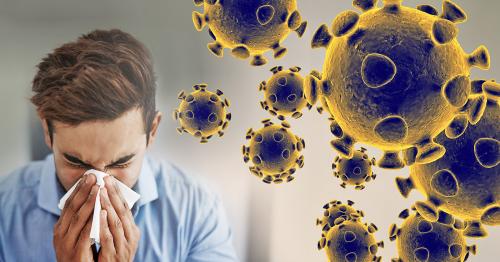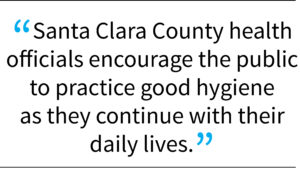Practice good hygiene habits — not only for the coronavirus but also for the even more dangerous flu virus

Photo courtesy FDA
The FDA is working with U.S. Government partners, including CDC, and international partners to closely monitor an outbreak caused by a novel (new) coronavirus first identified in Wuhan City, Hubei Province, China.
This editorial is the opinion of Morgan Hill Life
The convenience we enjoy with air travel also brings with it an element of danger to the human population through the global spread of contagious diseases. As outbreaks of the deadly coronavirus began spreading in China in December, the risk of exportation to other countries grew — including to Santa Clara County.
The virus — now known as Covid-19 — has killed more than 2,200 people globally since the outbreak began. More than 76,600 have been infected, the vast majority in mainland China.
Inevitably, because Silicon Valley has such a tight economic and cultural connection to Asia, we saw cases in the region of people infected with the respiratory illness. In early February, six cases were confirmed in California, four of them near South Valley.
A woman and a man in Santa Clara County and a married couple in San Benito County tested positive for the virus. They are being monitored closely while isolated at home. None were sick enough to be hospitalized. In the two Santa Clara County cases, the individuals came to the United States from the Wuhan, China region (the epicenter of the outbreak) to visit family here. In the San Benito County cases, the husband had recently traveled to Wuhan and spread the virus to his wife upon returning.
The illness was not unexpected in our region because of Silicon Valley’s large population and travel habits. More cases are likely to come in the county.
At a press conference, Dr. Sara Cody, Santa Clara County’s health officer, said the spread of coronavirus between close contacts “does not increase the risk” to the public at large. Both Santa Clara County patients became ill after arriving from China and both took steps to isolate themselves from others.
“That’s why I don’t think these two cases change the risk to the general public,” Cody said. “What would be significant is if we had a case without a history of travel to an area where we know the virus is circulating or without a known close contact.”
 Despite the alarm about coronavirus, public health officials say influenza is still a far greater threat to most Americans, killing more than 61,000 people in the U.S. alone during the 2017-18 season, according to Centers for Disease Control estimates.
Despite the alarm about coronavirus, public health officials say influenza is still a far greater threat to most Americans, killing more than 61,000 people in the U.S. alone during the 2017-18 season, according to Centers for Disease Control estimates.
However, coronavirus could grow into a pandemic. The World Health Organization announced that the newly discovered microbe poses a global health risk, declaring a public health emergency.
If the virus does spread to all corners of the world in a deadly pandemic, the impact will be horrendous as more severe cases place heavier demands on health care systems, including potentially locally at St. Louise Regional Hospital. Hospitals in Wuhan are now overwhelmed with patients. A pandemic might also force government officials to make stark choices about fair access to medicines or vaccines. It can also impact tourism and hurt our economy.
Dr. Tedros Adhanom Ghebreyesus, the head of the World Health Organization, warned that if a few cases of the novel coronavirus arise that are spread by people who never traveled to China, that could be an indicator of more infected individuals.
“The detection of a small number of cases may indicate more widespread transmission in other countries; in short, we may only be seeing the tip of the iceberg,” he wrote in a statement. “Containment remains our objective, but all countries must use the window of opportunity created by the containment strategy to prepare for the virus’ possible arrival.”
Santa Clara County health officials encourage the public to practice good hygiene as they continue with their daily lives. People who are healthy should not be barred from any activities because of their race, country of origin or recent travel, officials said.
Those who experience symptoms such as a cough, sore throat or fever should stay home, practice proper cough etiquette and hand hygiene, and limit their contact with other people.
Symptoms of coronavirus are similar to the flu. They include fever, coughing, and shortness of breath, according to the California Public Health Department. Some infected people have experienced mild respiratory illness while others have had more severe cases. The best way to prevent the spread of any virus is to wash your hands, cover your mouth with a tissue, sleeve or arm when coughing or sneezing, and avoid contact with others, especially large gatherings, if you have respiratory symptoms.
This is not the time to panic. However, it is important to practice good hygiene habits — not only for the coronavirus but also for the even more dangerous flu virus.






